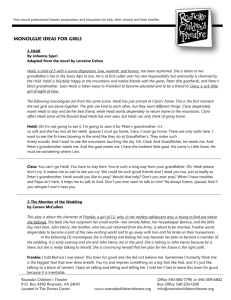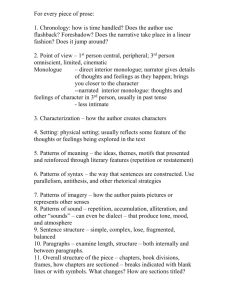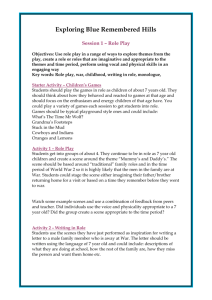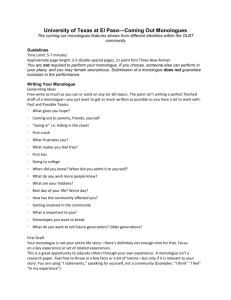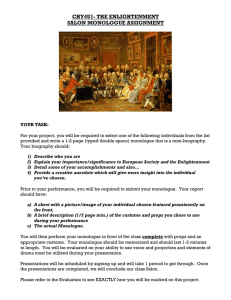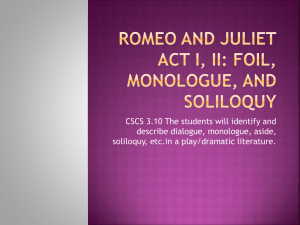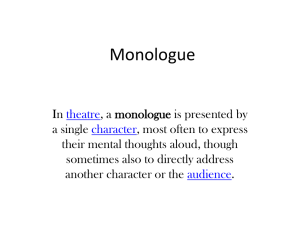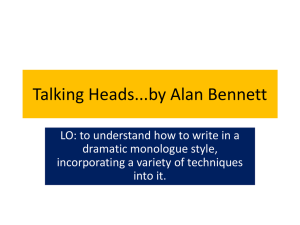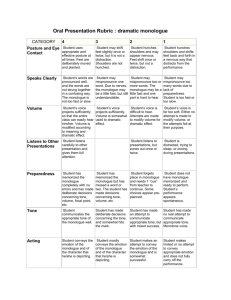Monologues- Girls - McCoy Rigby Conservatory Of The Arts
advertisement
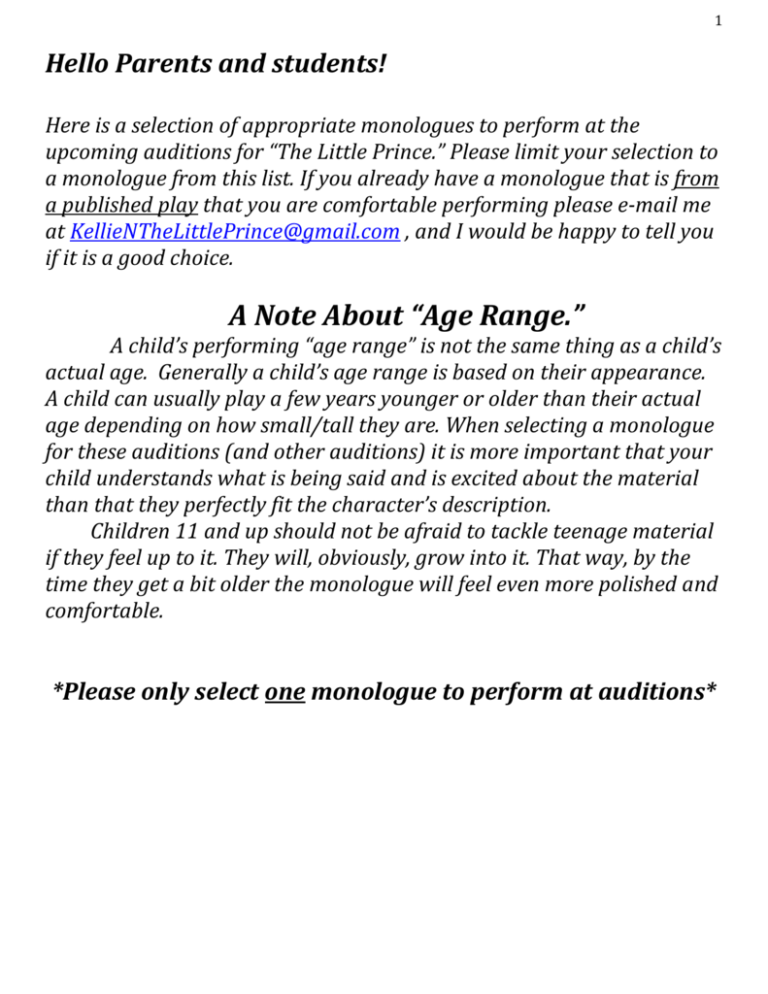
1 Hello Parents and students! Here is a selection of appropriate monologues to perform at the upcoming auditions for “The Little Prince.” Please limit your selection to a monologue from this list. If you already have a monologue that is from a published play that you are comfortable performing please e-mail me at KellieNTheLittlePrince@gmail.com , and I would be happy to tell you if it is a good choice. A Note About “Age Range.” A child’s performing “age range” is not the same thing as a child’s actual age. Generally a child’s age range is based on their appearance. A child can usually play a few years younger or older than their actual age depending on how small/tall they are. When selecting a monologue for these auditions (and other auditions) it is more important that your child understands what is being said and is excited about the material than that they perfectly fit the character’s description. Children 11 and up should not be afraid to tackle teenage material if they feel up to it. They will, obviously, grow into it. That way, by the time they get a bit older the monologue will feel even more polished and comfortable. *Please only select one monologue to perform at auditions* 2 Heidi By Johanna Spyri Adapted from the novel by Lorraine Cohen Heidi, a child of 5 with a sunny disposition, love, warmth, and humor, has been orphaned. She is taken to her grandfather’s hut in the Swiss Alps to live. He is at first sullen over his new responsibility but eventually is charmed by the child. Heidi is blissfully happy in the mountains and makes friends with the goats, Peter (the goatherd), and Peter’s blind grandmother. Soon Heidi is taken away to Frankfurt to become educated and to be a friend to Clara, a sick little girl of eight of nine. The following monologues are from the same scene. Heidi has just arrived at Clara’s home. This is the first moment the two girls are alone together. The girls are kind to each other, but they want different things. Clara desperately wants Heidi to stay and be her best friend, while Heidi wants desperately to return home to the mountains. Clara offers Heidi some of the fanciest food Heidi has ever seen, but Heidi can only think of going home. Heidi: Oh I’m not going to eat it. I’m going to save it for Peter’s grandmother, it’s so soft and she has lost all her teeth. (pause) I must go home, Clara. I must go home. There are only walls here. I want to see the fir trees blowing in the wind like they do at Grandfather’s. They make such lovely sounds. And I want to see the mountains touching the sky. Oh, Clara! And Grandfather, he needs me. And Peter’s grandmother needs me. And the goat needs me. I have the loveliest little goat. His name is Little Swan. He must be wondering where I am. _________ Clara: You can’t go Heidi. You have to stay here. You’re such a long way from your grandfather. Oh, Heidi please don’t cry. It makes me so sad to see you cry. We could be such good friends and I need you too, just as badly as Peter’s grandmother. Heidi would you like to pray? Would that help? Don’t you ever pray? When I have troubles and Papa isn’t here, it helps me to talk to God. Don’t you ever want to talk to him? He always listens. (pause) And if you whisper I won’t hear you. 3 “The Member of the Wedding” by Carson McCullers This play is about the character of Frankie, a girl of 12, who, in her restless adolescent way, is trying to find out where she belongs. She feels she has outgrown her small world—her remote father, her housekeeper Bernice, and the little boy next door, John Henry. Her brother, who has just returned from the Army, is about to be married. Frankie wants desperately to become a part of this new exciting world and to go away with him and his bride on their honeymoon. In the following (3) monologues she is thinking and feeling her way towards her plan to become a member of the wedding. It is early evening and she and John Henry are in the yard. She is talking to John Henry because he is there, but she is really talking to herself. She is convincing herself that her plan for her future is the right path. Frankie: I told Bernice I was leavin’ this town for good and she did not believe me. Sometimes I honestly think she is the biggest fool that ever drew breath. You try and impress something on a big fool like that, and it’s just like talking to a block of cement. I kept on telling and telling and telling her. I told her I had to leave this town for good because it is inevitable. _________ Frankie: Don’t bother me John Henry. I’m thinking. About the wedding. About my brother and the bride. Everything’s been so sudden today. I never believed before about the fact that the earth turns at the rate of about a thousand miles a day. I didn’t understand why it was that if you jumped into the air you wouldn’t land in Selma or Fairview or somewhere else instead of the same back yard. But now it seems to me I feel the world going around very fast. (Frankie begins turning around in circles with her arms outstretched) I feel it turning and it makes me dizzy. _________ Frankie: Shush, just now I realized something. The trouble with me is that for a long time I have been just an “I” person. All other people can say “we.” When Bernice says “we” she means her lodge and church. Soldiers can say “we” and mean the army. All people belong to a “we” except me. Not to belong to a “we” makes you too lonesome. Until this afternoon I didn’t have a “we” but now after seeing Janice and Jarvis I suddenly realize something. I know that the bride and my brother are the “we” of me. This coming Sunday when my brother and the bride leave this town, I’m going with the two of them to Winter Hill. And after that to whatever place that they will ever go. (pause) I love the two of them so much because they are the we of me. 4 “Little Women” Based on the Novel by Luisa May Alcott The story of the trials and tribulations of the March family. The lady like Meg, the tomboyish Jo, the vain Amy, and the gentle Beth, growing up in the nineteenth century poor but happy under the watchful eye of their mother. Their father is away fighting in the Civil War. Adapted for the stage by Lorraine Cohen The following monologue is taken from the first scene in the play. Jo, a spirited and tomboyish girl in her early-mid teens, laments the fact that she cannot live the way she choses because it is not proper for a girl. It is not that Jo wants to be a boy. It is more that she wants a different life than the one available to girls at this time. She feels trapped and useless. Meg has just said to Jo: “Remember that you are a young lady.” Jo tries to convince Meg that it is not right to expect ladylike behavior from her. Jo: I ain’t a lady! And if turning up my hair makes me one, I’ll wear it in two tails till I’m twenty. I hate to think I’ve got to grow up and be Miss March, and wear long gowns, and look as prim as China Aster. It’s bad enough to be a girl, anyway, when I like boys’ games and work, and manners. I can’t get over my disappointment in not being a boy, and it’s worse now than ever, for I’m dying to go and fight with Papa, and I can only stay at home and knit like a poky old woman. _________ 5 “Little Women” Based on the Novel by Luisa May Alcott The story of the trials and tribulations of the March family. The lady like Meg, the tomboyish Jo, the vain Amy, and the gentle Beth, growing up in the nineteenth century poor but happy under the watchful eye of their mother. Their father is away fighting in the Civil War. Adapted for the stage by John D. Ravold In the following monologue Beth March, a very sick girl in her early-mid teens, tells her sister Jo that knows she is dying, and has very little time left. Beth is scared, but does not want to show Jo her fear. Beth has always been incredibly generous and thought of others before herself. Here she tries to comfort Jo and ensure that her family will be able to stay strong after she has gone. ***This is a very challenging monologue. Do not play it “sad.” They key is to show Beth’s quiet strength. Even when she is most afraid she puts the welfare of her family before her own. If tears come that is fine, but do not try to make them happen. Beth: You’ll tell the others won’t you Jo? I’ve heard that people who love us best are often blindest to such things. If they don’t see it you can tell them for me. I don’t want any secrets and it’s kinder to prepare them. Meg has John to comfort her, Laurie will comfort Amy, but you must stand by Father and Mother. Won’t you, Jo? I don’t know how to express myself and shouldn’t try to anyone but you, because I can’t speak out to anyone but you. Jo, dear. Don’t hope anymore. It won’t do any good. I’m sure of it. We won’t be miserable, but enjoy being together while we wait. We’ve had happy times together, haven’t we Jo? And I think the tide will go out easily, if you help me. 6 By: John Boruff “The Loud Red Patrick” This play takes place in 1912. Their father Patrick, a widower, is raising the Flannigan girls to be strong, educated, and independent young women. When Maggie Flannigan, a spirited girl of seventeen, announces she is not going to Vassar as planned, but will instead be getting married to her beau Ralph, Patrick Flannigan is outraged. It is the custom of the household to solve arguments by holding a mock trial. Patrick acts as judge and Maggie’s case is brought before the family court. Maggie argues her case brilliantly, but Patrick still refuses to give his blessing to the marriage. Here Maggie announces that she will not take no for an answer. Maggie: How dare you speak to Ralph in such a way. I choose my husband. And I choose when to marry him! I may be seventeen in age, but I am not seventeen in my heart, and I know what I want. A nice decent boy came to call on me. A boy who loves me and wants to marry me, and my big broad-minded liberal talking father insulted him and humiliated me. I won the right to be married here this afternoon and you took it away from me. You always said it yourself. The Flannigans were never made for tyranny. All right. You have asked for it. This means war! 7 Anne of Green Gables By L.M. Montgomery Adapted for the stage by: Joseph Robinette “Anne of Green Gables” tells the story of an imaginative and passionate little orphan named Anne Shirley. She has been brought to the home of an older brother and sister, Marilla and Mathew Cuthbert by mistake. The two were expecting a boy to come from the orphanage to help with the farm work. Anne’s wild imagination and temperamental ways both endear her to the pair of siblings and make her a challenging addition to the family. In this first monologue Anne is apologizing to Marilla’s closest friend Mrs. Rachel Lynde. In the previous scene Mrs. Lynde criticized Anne’s appearance, making fun of her red hair and her boyish figure. Anne called Mrs. Lynde a thing or two in return causing Marilla to threaten to send Anne back the orphanage unless she apologized to Mrs. Lynde. With flair for the dramatic and a heartfelt sincerity Anne delivers an apology that ensures she will stay at Green Gables. Anne: Oh, Mrs. Lynde, I’m so extremely sorry. I could never express my sorrow even if I used a whole dictionary. I’ve behaved badly toward you, and disgraced my dear friends, Mathew and Marilla, who have let me stay at Green Gables even though I’m not a boy. And you did tell the truth. My hair is red, and I’m freckled and skinny and ugly. If you don’t forgive me, it will inflict a lifetime of sorrow on a poor little orphan girl. Please say you’ll forgive me, Mrs. Lynde. _________ In a previous scene Anne invites her best friend Diana over to tea and mistakenly gives her wine to drink. Diana rapidly becomes drunk and as a result Diana’s mother no longer allows Anne to speak to her. After Anne is severely punished for an outburst of temper at school, Diana attempts to comfort her. In the following monologue Anne interrupts Diana and says goodbye in her truly dramatic fashion. Anne: No you mustn’t speak to me, Diana. You must honor your mother’s orders. Oh, Diana, now we won’t ever see each other again. But in the years to come, thy memory will shine like a star over my lonely life. I read that somewhere. Wilt thou give me a lock of thy jet-black tresses in parting to treasure forevermore? Now you must go, lest we be seen together. Fare-theewell, my beloved friend. Henceforth we must be strangers, though my heart will ever be faithful to thee. 8 Brighten Beach Memoirs By Neil Simon Set in the Brighton Beach section of Brooklyn, New York in 1937, this coming-of-age comedy focuses on Eugene Morris Jerome, a Polish-Jewish American teenager who experiences puberty, and a search for identity as he tries to deal with his family, including his older brother Stanley, his parents Kate and Jack, and Kate's sister Blanche and her two daughters, Nora(16) and Laurie(13), who come to live there after their father's death .Laurie has a chronic illness that the family must cater to. Nora has often felt less important in her mother’s eyes. In this monologue Nora is confronting her mother about their relationship. Nora: Judge you? I can't even talk to you. I don't exist to you. I have tried so hard to get close to you, but there was never any room. Whatever you had to give went to Daddy, and when he died, whatever was left you gave to-- ... (pause) I have been jealous my whole life of Laurie, because she was lucky enough to be born sick. I could never turn a light on in my room at night or read in bed because Laurie always needed her precious sleep. I could never have a friend over on weekends because Laurie was always resting. I used to pray I'd get some terrible disease or get hit by a car and have a leg all twisted or crippled and then once, maybe just once, I'd get to crawl into bed with you on a cold rainy night and talk to you and hold you until I fell asleep in your arms...just once... 9 By Paul Zindel The Effect of Gamma Rays On Man-In-The-Moon Marigolds Winner of the Pulitzer Prize for drama, this play is the story of Mathilda (Tillie) Hunsdorfer, a bookish, shy, yet inwardly beautiful young high school student who overcomes abuse from a jealous and acid-tongued mother and the vengeance of a pretty but mean-spirited sister. Encouraged by a teacher, Tillie carries out a gamma ray experiment with marigold seeds that wins her a prize at the school Science Fair. Through Tillie’s experiment we learn that beauty can flourish even in the most barren conditions. In the two monologues that follow Tillie is awakened to the beauty of science. In the interest of audition time limits I have cut out portions of these monologues. If you are interested in the working on the full length monologue for another purpose please let me know. Tillie: Today I saw it. Behind the glass a white cloud began to form. He placed a small piece of metal in the center of the chamber and we waited until I saw the first one- a trace of smoke that came from nowhere and then disappeared. And then another and another, until I knew it was coming from the metal. They looked like water sprays from a park fountain, and they went on and on for as long as I watched. And he told me the fountain of smoke would come forth for a long time, and if I had wanted to, I could have stayed there all my life and would never had ended—that fountain, so close I could have touched it. Tillie: He told me to look at my hand, for a part of it came from a star that exploded too long ago to imagine. This part of me was formed from a tongue of fire that screamed through the heavens until there was our sun. And this part of me—this tiny part of me was on the sun when it itself exploded and whirled in a great storm until the planets came to be. And he said this thing was so small—this part of me was so small it couldn’t be seen—but it was there from the beginning of the world. And he called this bit of me an atom. And when he wrote the word, I fell I love with it. Atom. Atom. What a beautiful word. _____________________ 10 The following monologue is delivered as a speech at a high school science fair by one of the contestants, who apparently is overly satisfied with herself and her accomplishment with a ridiculous science experiment. It is a darkly comedic piece meant to contrast with Millie’s educated and passionate speeches about science. Janice: “The Past”: I got the cat from the A.S.P.C.A. immediately after it had been killed by a high altitude pressure system. That explains why some of the rib bones are missing, because the method sucks the air out of the animal’s lungs and ruptures all cavities. They say it prevents cruelty to animals but I think it’s horrible. (she laughs) Then I boiled the cat in a sodium hydroxide solution until most of the skin came right off. I have to go to “The Present” now—but I did want to tell you how long it took me to put the thing together. I mean, as it is now, it’s extremely useful for students of anatomy, even with the missing ribs bones. That’s about the only present use of it I can think of for it. But it’s nice to remember as an accomplishment, and it looks good on college applications to show that you did something else in school besides dating. (she laughs again) “The Future”: As far as my future plans, I’m going to donate it to the science department, of course, and next year, if there’s another Science Fair perhaps I’ll do the same thing with a dog. Thank you very much for your attention, and I hope I win! 11 You’re a Good Man Charlie Brown By Clark Gesner Based on the Comic Strip “Peanuts” by Charles M. Schultz Charlie Brown, Lucy, Linus, Sally, Schroeder, and Snoopy all gather onstage for this fun-filled live action version of the comic strip. Charlie Brown is thoughtful and hopeful as usual and all the other characters retain their dynamic personalities we remember. Though they all assure Charlie Brown that he is a “good man” despite his obvious flaws, he wonders if he really is what they say. Throughout the play he tries to decide how he can really become a good person Sally has just received a “c” grade on her elementary school art project. In this monologue she will attempt to convince her teacher to raise her grade to a more appropriate letter. Sally: A “C”? A “C”? I got a “C” on my coat hanger sculpture? How could anyone get a “C” in coat hanger sculpture? May I ask a question? Was I judged on the piece of sculpture itself? If so, is it not true that time alone can judge a work of art? Or was I judged on my talent? If so, is it fair that I be judged on a part of my life over which I have no control? If I was judged on my effort, then I was judged unfairly, for I tried as hard as I could! Was I judged on what I had learned about this project? If so, then were not you, my teacher, also being judged on your ability to transmit your knowledge to me? Are you willing to share my “D”? Perhaps I was being judged on the quality of coat hanger itself out of which my creation was made...now is this not also unfair? Am I to be judged by the quality of coat hangers that are used by the dry-cleaning establishment that returns our garments? Is that not the responsibility of my parents? Should they not share my “D”? (pauses) Thank you, Miss Othmar. (to audience) The squeaky wheel gets the grease! 12 Lucy shares her career goals with her unbelieving friends in this comedic monologue. Lucy: Do you know what I intend? I intend to be a queen. When I grow up I’m going to be the biggest queen there ever was, and I’ll live in a big palace and when I go out in my coach, all the people will wave and I will shout at them, and...and...in the summertime I will go to my summer palace and I’ll wear my crown in swimming and everything, and all the people will cheer and I will shout at them... What do you mean I can’t be queen? Nobody should be kept from being a queen if she wants to be one. It’s usually just a matter of knowing the right people.. ..well.... if I can’t be a queen, then I’ll be very rich then I will buy myself a queendom. Yes, I will buy myself a queendom and then I’ll kick out the old queen and take over the whole operation myself. I will be head queen." -------Here Lucy seizes another opportunity to show her elevated level of knowledge. She is constantly instructing Linus (or anyone else that will listen) and in this case her subject is Charlie Brown’s face. Lucy: Now Linus, I want you to take a good look at Charlie Brown's face. Would you please hold still a minute, Charlie Brown, I want Linus to study your face. Now, this is what you call a Failure Face, Linus. Notice how it has failure written all over it. Study it carefully, Linus. You rarely see such a good example. Notice the deep lines, the dull, vacant look in the eyes. Yes, I would say this is one of the finest examples of a Failure Face that you're liable to see for a long while. 13 By Tom Jones The Fantasticks This charming musical fable tells the tale of two young neighbors Luisa (age 16) and Matt (19) who are unknowingly pushed together by their fathers. It is told in the style of a fairy tale complete with a mysterious narrator names El Gallo: boy meets girl, they are kept a part by parents, boy rescues girl and parents relent to the match. However in Act II the fairy tale turns sour. The young couple fight separate, see the world, and eventually discover all they ever wanted was each other. In the following monologue we Luisa introduces herself to the audience. She is an unusual, spirited and imaginative girl who is not shy about sharing her hopes and fears. The poetic style the monologue is written in should influence the fairy tale tone of the piece, but it should be delivered as if you were reading a poem. Pay attention to character, train of thought etc. Luisa: This morning a bird woke me up. It was a lark or a peacock, Or something like that. Some strange sort of bird that I’d never heard. And I said “hello” And it vanished: flew away. The very minute that I said “hello.” It was mysterious So do you know what I did? I went over to my mirror And brushed my hair two hundred times Without stopping. And as I was brushing it, My hair turned gold! No, honestly! Gold! And then red. And then sort of a deep blue when the sun hit it. I’m sixteen years old, And every day something happens to me. I don’t know what to make of it. When I get up in the morning to get dressed, I can tell: Something’s different. 14 I like to touch my eyelids Because they’re never quite the same. (she touched her eyelids) Oh!Oh!Oh! I hug myself till my arms turn blue, Then I close my eyes and cry and cry and cry Till the tears come down And I taste them. Ah! I love to taste my tears! I am special. I am special. Please, God, please--Don’t let me be normal! 15 How to Eat Like a Child: And Other Lessons in Not Being a Grownup This musical comedy revue is treated like an instruction manual for children. Each song, sketch, or monologue has a title. The following monologue is called “How to Watch More television.” The actor can actually recite the title prior to performing the monologue if her chooses. Darien was the name of the child that originally performed this piece. There is no specific age or gender assigned to this monologue. Be careful not to play it all one way. Use different tactics. Beg, negotiate, threaten, sob, flatter etc… Darien: Please, Mom, please. Just this once. I’ll only ask this once. I promise, if you let me watch this show, I’ll go to bed the second it is over. I won’t complain. I won’t ask for a drink of water. I won’t ask for anything. Please. If you let me do this, I’ll never ask you for anything ever again. Never. Please, Mommy, please. You are the nicest mommy. You are the sweetest, nicest mommy. I promise I won’t be cranky tomorrow. I promise I’ll go to bed tomorrow at nine. Please, please, please. (pause) Why not! Just give me one reason. I told you I’ll be good. I told you I’ll go to bed. Don’t you believe me? Don’t you trust me? Some mom- doesn’t even trust her own kid. Look, I’ll just close my eyes and listen. I won’t even watch it! Oh, Mom, why can’t I?
